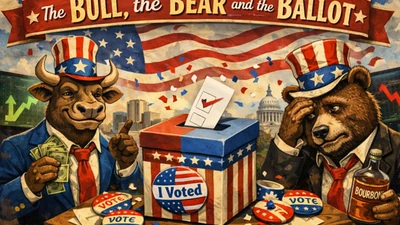Over the past two weeks, the stock market has posted an impressive rally, with major indices like the Dow, S&P 500, and Nasdaq all climbing on the back of renewed investor optimism. Wall Street headlines are calling it a "spring surge" and touting strong earnings from big tech and falling inflation indicators. But from a conservative perspective, this sudden optimism deserves a healthy dose of skepticism.
The Rally Is Real, But So Are the Risks
Yes, it's true: equities have rebounded strongly. Tech giants posted better-than-expected earnings, and consumer sentiment ticked up modestly. Treasury yields have cooled slightly, and whispers of a “soft landing” are again making the rounds.
But conservatives recognize the importance of fundamentals—not just short-term sentiment. The rally is being driven more by emotion and central bank speculation than by any meaningful improvement in America’s economic foundation. Trillions in government spending, persistent fiscal deficits, and a ballooning national debt are still hanging over the economy like a sword of Damocles.
Don't Forget Washington’s Role
This market momentum conveniently distracts from the long-term consequences of Bidenomics. While the administration touts “resilience,” conservatives see overregulation, anti-energy policies, and reckless spending as the real drivers of inflation and economic distortion. The recent dip in inflation may provide temporary relief, but it's not a sign that these underlying issues have been solved.
Moreover, the Federal Reserve’s delicate dance between taming inflation and appeasing markets continues to inject artificial liquidity into the system. Investors know this. That’s why speculation around potential rate cuts is helping fuel this surge. But relying on the Fed to prop up markets is not a sustainable economic strategy.
Earnings vs. Economic Reality
It's also worth noting that much of the recent market success has been concentrated in a few mega-cap stocks. This is not broad-based economic strength—it’s a reflection of the growing disconnect between Wall Street and Main Street.
Small businesses, which are the backbone of the American economy, continue to struggle with rising input costs, worker shortages, and regulatory burdens. While the S&P soars, families still face high grocery bills, unaffordable housing, and declining purchasing power.
Caution, Take A Breath, Focus
From a conservative point of view, the last two weeks of market growth are not a green light to celebrate, but a yellow light to proceed with caution. Asset bubbles and false optimism have consequences. True economic health comes from fiscal responsibility, energy independence, and policies that unleash—not restrict—American innovation.
Until we see real reforms in Washington, a return to free-market principles, and a reduction in government overreach, this market rally may be more of a sugar high.










